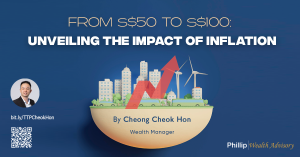No need to overreact despite concerns over Omicron December 16, 2021

The emergence of the Omicron variant of the COVID-19 virus has caused individuals, nations and investors to react with fear and concern. The variant was first reported to the World Health Organisation (WHO) on 24 November, with the first confirmed specimens found on 8 November in South Africa, and on 9 November in neighboring Botswana. As of 7 December, there were cases of the Omicron variant in 52 countries across the world.
Omicron was designated by the WHO as a “variant of concern” on 26 November, due in large part to the fact that the variant, otherwise known as B.1.1.529, has 32 mutations in its spike protein. This means that the Omicron variant has almost double the number of mutations as the Delta variant, which is the current dominant strain of COVID-19 in the world.
Spike protein mutations are of concern as it is the protein which allows the virus to attach itself to and to infect human cells. Hence, a large number of mutations in the spike protein could mean that the Omicron strain has an increased ability to infect. There are also concerns that these mutations may affect the ability of diagnostic tests to detect the variant, and may also reduce the effectiveness of vaccines being used currently.
Increase in market volatility due to COVID-19 resurgence fears
Stock markets across the world reacted badly to the news of the Omicron variant. On 26 November, the day Omicron was designated as a “variant of concern” by the WHO, the Dow Jones Industrial Average fell by 905.04 points, or 2.53%; the S&P 500 index lost 2.27%; while the Nasdaq Composite lost 2.23%.
In Asia, the Hang Seng index fell by 2.67% while the Nikkei 225 index in Japan lost 2.53% and Singapore’s Straits Times Index declined by 1.72%.
There are concerns that the Omicron variant may slow the process of lifting restrictions and reopening economies, thereby affecting economic expansion.
However, early data coming out from South Africa suggest that while the Omicron variant may be more transmissible, most patients experience only mild symptoms and hospitalized cases do not require oxygen support.
The US White House’s Chief Medical Adviser, Dr Anthony Fauci, also said on 5 December that the early data about the variant is “a bit encouraging”, but added that more information is necessary for a clearer picture on the effects of the variant.
Investors have responded positively to the release of the data, with the Dow rising 647 points on 6 December and 492 points on 7 December; the S&P 500 index gaining 1.1% on Monday and 2.07% on Tuesday; and the Nasdaq Composite Index ending Monday 0.9% higher, before rising 3% on Tuesday.
In Asia, the Hang Seng index was up 2.72%, while the Nikkei 225 was up 1.89%. The Straits Times Index in Singapore was up 0.59%, or 18.34 points.
Investors should continue to pay close attention to travel stocks as the Omicron situation develops and more research is being done on the effects of the variant.
While the stocks of cruise operators like Carnival Corporation (NYSE:CCL), Royal Caribbean (NYSE:RCL) and airlines like United Airlines (NASDAQ:UAL) were badly hit when news of the variant first emerged, falling by 11%, 13.2% and 9% respectively on 26 November, they have since recovered, with all three counters rising by more than 8% on 6 December. However, if there are any adverse news reports with regard to the severity of the Omicron variant, these stocks may once again come under pressure.
Another sector that investors should look at is vaccine producers — Pfizer (NYSE:PFE), Moderna (NASDAQ:MRNA) and Novavax (NASDAQ:MVAX) amongst others.
All three firms have announced that they are either in the midst of developing vaccines tailored for the Omicron variant, or in the case of Pfizer, it said that it can modify the original vaccine to ensure it is suitable to tackle the Omicron variant, and that it can be ready “within 100 days”.
Analysts have forecast Pfizer’s revenue to top USD100 billion next year, and this is due in large part to sales of its vaccine and its COVID-19 antiviral treatment pill. It is expected that orders for COVID-19 vaccines will continue to remain at healthy levels as we move into 2022.
Lack of consensus from the scientific community
However, it is important to note that there is little or no scientific consensus at the moment on the severity and transmissibility of Omicron, in relation to other variants such as Delta, which is the current dominant strain.
While there are also concerns with regard to vaccine effectiveness, there is a concerted effort from researchers to establish if current vaccines are still effective against Omicron. There is also a focus on whether a booster shot, or a third dose would increase effectiveness.
Pfizer is conducting a study where they are retrieving antibodies from individuals who have had two or three doses of the Pfizer/BioNTech mRNA vaccine and determining the ability of the antibodies to resist and defeat Omicron.
While the world waits for more comprehensive and concrete scientific data from researchers, markets will continue to be volatile and be driven by either positive or adverse news developments.
Hence, it is crucial for investors to not overreact and to continue to keep a close eye on the latest developments and data.
Reference
- https://www.straitstimes.com/singapore/mutations-in-omicrons-spike-protein-may-affect-ability-to-detect-and-counter-it-kenneth
- https://www.cnbc.com/2021/11/26/stock-futures-open-to-close-market-news.html
- https://www.straitstimes.com/business/companies-markets/asia-stocks-tumble-havens-rally-on-worry-over-new-covid-19-variant-sti
- https://www.nature.com/articles/d41586-021-03552-w
- https://www.theguardian.com/world/live/2021/dec/02/coronavirus-news-live-south-africa-sees-exponential-increase-in-covid-cases-dominated-by-omicron-variant?page=with:block-61a8197e8f08988db2bebd49#block-61a8197e8f08988db2bebd49
- https://www.npr.org/sections/goatsandsoda/2021/12/02/1060624669/scientists-race-to-answer-the-question-will-vaccines-protect-us-against-omicron
- https://www.barrons.com/articles/pfizer-stock-sales-covid-19-vaccine-pill-51637676691
- https://www.ft.com/content/80ff536b-6994-4954-9b6d-06c57123e037
- https://www.fool.com/investing/2021/11/28/moderna-pfizer-and-novavax-are-must-own-stocks-thi/
- https://www.marketwatch.com/articles/things-to-know-today-51638870964?mod=hp_LATEST
- https://www.cnbc.com/2021/12/06/stock-market-futures-open-to-close-news.html
- https://www.cnbc.com/2021/12/07/stock-market-futures-open-to-close-news.html
- https://apnews.com/article/coronavirus-pandemic-joe-biden-lifestyle-health-travel-ef7c250c58b90b9835a972d7ebd9556b
- https://www.businesstimes.com.sg/stocks/sti-up-059-as-omicron-concerns-ease
Disclaimer
These commentaries are intended for general circulation. It does not have regard to the specific investment objectives, financial situation and particular needs of any person who may receive this document. Accordingly, no warranty whatsoever is given and no liability whatsoever is accepted for any loss arising whether directly or indirectly as a result of any person acting based on this information. Opinions expressed in these commentaries are subject to change without notice. Investments are subject to investment risks including the possible loss of the principal amount invested. The value of the units and the income from them may fall as well as rise. Past performance figures as well as any projection or forecast used in these commentaries are not necessarily indicative of future or likely performance. Phillip Securities Pte Ltd (PSPL), its directors, connected persons or employees may from time to time have an interest in the financial instruments mentioned in these commentaries. Investors may wish to seek advice from a financial adviser before investing. In the event that investors choose not to seek advice from a financial adviser, they should consider whether the investment is suitable for them.
The information contained in these commentaries has been obtained from public sources which PSPL has no reason to believe are unreliable and any analysis, forecasts, projections, expectations and opinions (collectively the “Research”) contained in these commentaries are based on such information and are expressions of belief only. PSPL has not verified this information and no representation or warranty, express or implied, is made that such information or Research is accurate, complete or verified or should be relied upon as such. Any such information or Research contained in these commentaries are subject to change, and PSPL shall not have any responsibility to maintain the information or Research made available or to supply any corrections, updates or releases in connection therewith. In no event will PSPL be liable for any special, indirect, incidental or consequential damages which may be incurred from the use of the information or Research made available, even if it has been advised of the possibility of such damages. The companies and their employees mentioned in these commentaries cannot be held liable for any errors, inaccuracies and/or omissions howsoever caused. Any opinion or advice herein is made on a general basis and is subject to change without notice. The information provided in these commentaries may contain optimistic statements regarding future events or future financial performance of countries, markets or companies. You must make your own financial assessment of the relevance, accuracy and adequacy of the information provided in these commentaries.
Views and any strategies described in these commentaries may not be suitable for all investors. Opinions expressed herein may differ from the opinions expressed by other units of PSPL or its connected persons and associates. Any reference to or discussion of investment products or commodities in these commentaries is purely for illustrative purposes only and must not be construed as a recommendation, an offer or solicitation for the subscription, purchase or sale of the investment products or commodities mentioned.
About the author
Ming Jie
Investment Specialist
Phillip Investor Centre (Holland Drive)
Ming Jie is an Investment Specialist at Phillip Investor Centre (Holland Drive) and specialises in providing investment advisory services to retail clients, with a focus on helping clients to build and manage unit trust portfolios that can help to achieve their investment objectives. He joined Phillip Securities in 2017 and graduated from University of London with an external honours degree in Economics and Finance.

 Back in Business: The Return of IPOs & Top Traded Counters in March 2024
Back in Business: The Return of IPOs & Top Traded Counters in March 2024  From $50 to $100: Unveiling the Impact of Inflation
From $50 to $100: Unveiling the Impact of Inflation  How to soar higher with Positive Carry!
How to soar higher with Positive Carry!  Why 2024 Offers A Small Window of Opportunity and How to Position Yourself to Capture It
Why 2024 Offers A Small Window of Opportunity and How to Position Yourself to Capture It 









